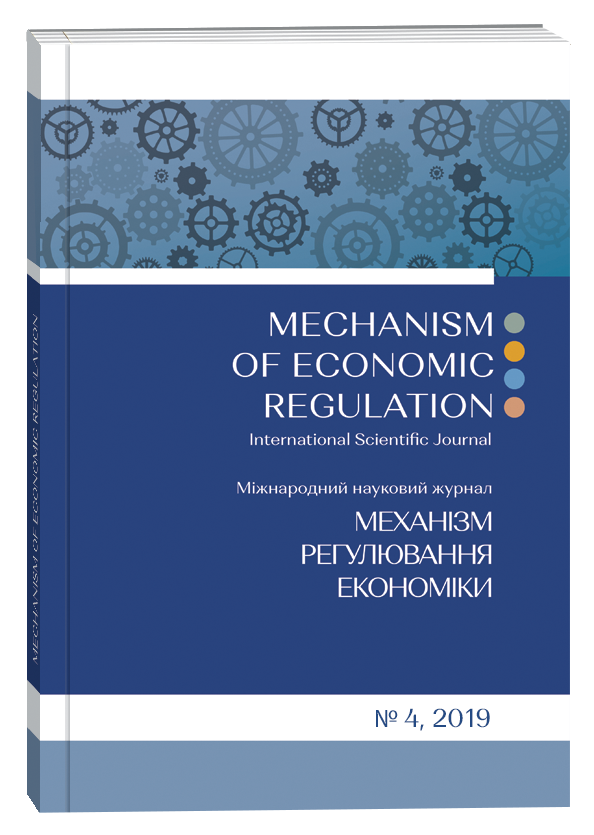STAFF MANAGEMENT PROCESS REENGINEERING IN THE CONTEXT OF ENHANCING DISABLED PEOPLE’S OPPORTUNITIES TO ENTERPRISES INNOVATIVE ACTIVITIES
Abstract
The modern practice of enterprise management requires dramatic changes, which is caused by the formation of an inclusive environment, increasing the dynamism of the labor market and increasing competition. Increasingly important for the efficiency of the enterprise is the use of innovation, knowledge embodied in the intellectual product. The reasons for the need for new approaches to management are related to changes in the business itself. Increased competition leads to an increase in the search for new management methods, especially in the area of personnel management, which in the long run requires appropriate management mechanisms based on a process approach in order to respond promptly and promptly to changing market conditions, improve the management system of partnerships and relationships with suppliers, achieving rapid response to consumer demands and improving product quality. The essence of reengineering of business process of personnel management as a modern concept of increase of efficiency of activity of the enterprise is investigated in the article. Business process reengineering is designed to create competitive advantages by systematically assessing processes, addressing the changing needs of potential and existing customers and requiring additional research to find new ways to improve reengineering in accordance with the specifics of domestic enterprises, especially in the field of personnel management. It was revealed that the innovative practice of enterprise management requires fundamental changes, which is due to the socialization of the world economy, aimed at improving the well-being of people with disabilities, reducing poverty and increasing the chances of finding decent work with adequate wages. The directions of including people with disabilities to innovative activities in the context of reengineering the personnel management process as one of the most important business processes of the enterprise are proposed.
References
Orlykovskyi, M. O. (2014) Novitni kontseptsii upravlinnia efektyvnosti diialnosti suchasnykh pidpryiemstv. [The Last Concepts of Performance Management of Modern Enterprises]. Efektyvna ekonomika. Vol .5.Retrieved from http://www.economy.nayka.com.ua/?op=1&z=3034
Ponomarenko, V. S. Minukhin S. V., Znakhur S. V. (2013) Teoriia ta praktyka modeliuvannia biznes-protsesiv: monohrafiia [Business Process Modeling Theory and Practice: A Monograph]. – Kh.: Vyd. KhNEU, P.244.
Honcharova, O. M. (2013) Reinzhynirynh biznes-protsesiv yak metod protsesnoho upravlinnia. [Business Process Reengineering as a Process Management Method]. Visnyk Kyivskoho natsionalnoho universytetu imeni Tarasa Shevchenka, 10(151), 78–82.
Ippolitova, I. Ya. (2016) Efektyvnist zdiisnennia reinzhynirynhu biznes-protsesiv na pidpryiemstvi. [Effectiveness of Business Process Reengineering at the Enterprise]. Hlobalni ta natsionalni problemy ekonomiky,13,264-270.
Stepanenko, T. O. (2015) Metodychni zasady proektuvannia ta upravlinnia yakistiu biznes-protsesiv. [Methodical Principles of Business Process Design and Quality Management]. Visnyk ONU imeni I.I. Mechnykova, 20, 146–150.
Prodius, O. I. (2018) Reinzhynirynh biznes-protsesiv yak suchasna kontseptsiia upravlinnia [Business Process Reengineering as a Modern Management Concept]. Elektronnyi naukovo- praktychnyi zhurnal «Ekonomika ta suspilstvo». Vol. 19. Retrieved from http://www.economyandsociety.in.ua/journal/19_ukr/89.pdf
Perehudova, T. V. (2016) Sotsialna inkliuziia yak element sotsialnoi polityky: Yevropeiski uroky dlia Ukrainy [Social Inclusion as an Element of Social Policy: European Lessons for Ukraine]. Naukovyi visnyk Mizhnarodnoho humanitarnoho universytetu, 19,98 – 102.
Pankovets, M. P. (2019) Innovatsiinyi rozvytok: problemy Ukrainy v konteksti svitovykh tendentsii [Innovative Development: Ukraine's Problems in the Context of Global Trends]. Naukovyi vicnyk Khepconskoho depzhavnoho universytetu. Cepiia «Ekonomichni nauky», 34, 109–112.


